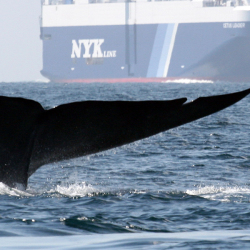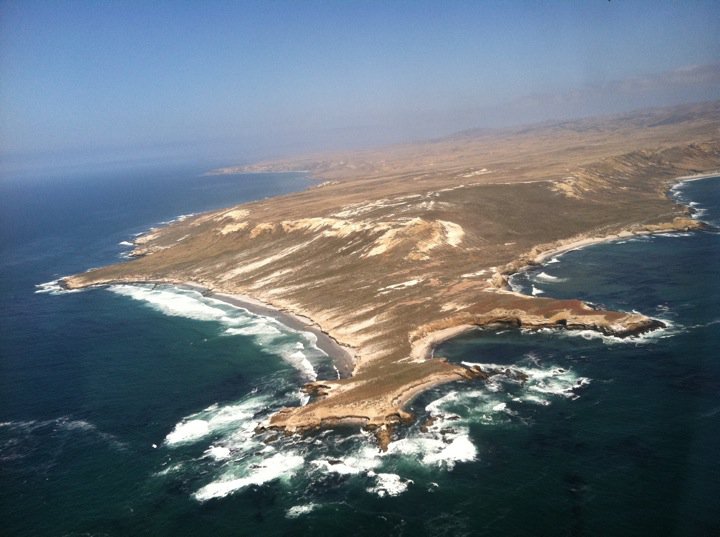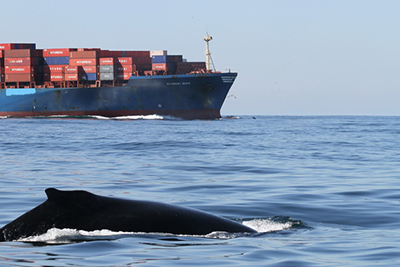
Blue Whales and Cargo Ships: Slowing Down to Protect the Largest Animal on the Planet

Photo by Kristen Hislop
One of the most spectacular days of my life was spent in my office. Of course, my “office” happened to be in a twin engine plane above the Pacific Ocean. I was working for the Channel Islands National Marine Sanctuary as a Sea Grant Fellow at that time and was lucky enough to get invited on a monitoring flight around the Channel Islands, in search of whales. That morning the coast was shrouded in fog and we were unsure if it would break up once we got offshore. While we had moderate expectations for the day, as we approached the Santa Cruz Island, the clouds parted and we were greeted with clear skies and lots of whales. We saw dozens of humpback and blue whales, each one as exciting to spot as the last. The magic of seeing a blue whale from a plane, watching from above the largest animal ever to live on this planet peacefully swimming through the ocean, was indescribable. In the end, this was one of the best survey flights the crew had taken and I felt like the luckiest person on earth to see so many of these animals that were once nearly driven to extinction. As we flew back toward the mainland, I watched a large cargo ship travel through the center of the Channel in the southbound shipping lane, on its way to the Port of Los Angeles or Long Beach. I hoped it was going slowly.

Photo by John Calambokidis
Whales may dwarf every other living thing on earth but they are no match for a cargo ship traveling at high speeds. Every year, whales are struck and killed by ships carrying goods around the world. In 2007, five blue whales were killed as a result of ship strikes in the Santa Barbara Channel alone. Because this was a much larger number of fatalities than usual, and due to the blue whale’s endangered status, this greatly concerned scientists. Even more upsetting is that these five whales may not tell the entire story. Most whales are negatively buoyant and sink when they die; therefore, fatal ship strikes mostly go undetected. Scientists estimate that the actual number of fatalities may be ten times higher than those discovered.
In response to the 2007 event, the Sanctuary and its Advisory Council began to consider ways to protect whales from ship strikes. As the Conservation Representative on the Council, the EDC pushed for NOAA and the Sanctuary to simply require ships to slow down through the Santa Barbara Channel when large congregations of whales were present, as the more slowly a ship travels the less likely it is to kill a whale if struck. Summer after summer, when there was a large number of whales passing through the Channel, NOAA sent out Local Notices to Mariners, requesting that ships slow to 10 knots or less. Unfortunately, ships continued to travel at their normal speeds and this voluntary program proved unsuccessful. Despite the lack of success with voluntary speed reduction, we remained optimistic about this conservation method. Accordingly, EDC researched other successful programs and in the process learned that slowing ships down also improves air quality. We learned that the Ports of Los Angeles and Long Beach operate a Green Flags program that improves air quality by offering reduced port fees and priority access to dock workers in exchange for ships to slow down when they are near the ports.
 With the knowledge that slowing ships not only protects whales but also improves air quality, the EDC partnered with the Sanctuary and the Santa Barbara County Air Pollution Control District (SBCAPCD) to bring in another element to the program—protecting air quality and human health. Slowing ships reduces ship emissions of ozone-forming nitrogen oxides (NOx) and greenhouse gases. Cargo ships are the highest polluter of NOx in Santa Barbara County (50%), and account for 25% of NOx in Ventura County. Rather than ask ships to slow down voluntarily, in 2014 we created a program that offered shipping companies $2,500 for trips during which their ships slowed to 12 knots or less through the Santa Barbara Channel from July to November, when the concentration of whales is highest and air quality is at its worst. The trial was deemed a success, with seven shipping companies slowing a total of 27 cargo ship transits by an average of 5.1 knots, fully utilizing available funding. This program resulted in a reduction of 12.4 tons of NOx and over 500 metric tons of regional greenhouse gases from baseline emissions. In addition, ships in this program were 50% less likely to fatally strike a whale than those traveling at greater speeds.
With the knowledge that slowing ships not only protects whales but also improves air quality, the EDC partnered with the Sanctuary and the Santa Barbara County Air Pollution Control District (SBCAPCD) to bring in another element to the program—protecting air quality and human health. Slowing ships reduces ship emissions of ozone-forming nitrogen oxides (NOx) and greenhouse gases. Cargo ships are the highest polluter of NOx in Santa Barbara County (50%), and account for 25% of NOx in Ventura County. Rather than ask ships to slow down voluntarily, in 2014 we created a program that offered shipping companies $2,500 for trips during which their ships slowed to 12 knots or less through the Santa Barbara Channel from July to November, when the concentration of whales is highest and air quality is at its worst. The trial was deemed a success, with seven shipping companies slowing a total of 27 cargo ship transits by an average of 5.1 knots, fully utilizing available funding. This program resulted in a reduction of 12.4 tons of NOx and over 500 metric tons of regional greenhouse gases from baseline emissions. In addition, ships in this program were 50% less likely to fatally strike a whale than those traveling at greater speeds.
The 2014 trial has turned into an annual program. In 2016, the Ventura County Air Pollution Control District joined the program and participation increased to ten global shipping companies, which resulted in 50 slowed transits. The 2016 program nearly doubled the benefits of the 2014 trial. This summer’s program (2017) has extended to the San Francisco Bay Area and now includes Cordell Bank, Greater Farallones, and Monterey Bay National Marine Sanctuaries and the Bay Area Air Quality Management District. These partnerships have greatly increased protection of whales and improved air quality along the California coast. The EDC continues to work on finding sustainable ways to continue this program into the future. In addition to our advocacy efforts on vessel speed reduction, the EDC has worked on several other strategies to reduce ship strikes. In 2012, our advocacy efforts led to a realignment of the southbound shipping lane in the Santa Barbara Channel that resulted in ships traveling one mile farther from the islands and away from an area where whales congregate to feed. Additionally, from 2015-2016, the EDC co-chaired a Sanctuary Advisory Council working group on marine shipping that explored other management ideas to further protect whales in our region. The EDC is continuing these efforts and remains committed to advocating for the protection of the whales that share the waters off our coast. If you are interested in staying up to date on this issue and learning more about other marine conservation issues EDC is working on, you can sign up for our newsletter. If you have questions, feel free to reach out to me, Kristen Hislop (Marine Conservation Program Director).
Tags: blue whales, cargo ships, Channel Islands National Marine Sanctuary, endangered, Marine, NOAA, Sanctuary, shipping lanes
Trackback from your site.






Denise Krakover- Lyons
| #
Please ADD me to your newsletter.
Thank you
Reply
PickyTop
| #
Most interesting Blue whale facts now is that of natural food-chain Blue Whales are very important for the smooth flow of ecosystem they ensure no certain animal overpopulates ocean by doing this they maintain a proper balance.
Apart from eco-system these humble giants a living proof the wonders nature can create which is also important for making sure our future generation see these beautiful creations.
Reply
Amir Articles
| #
Please ADD me to your newsletter.
Thank you
[email protected]
Reply
discount Partner
| #
Please ADD me to your newsletter.
Thank you
Reply
stress
| #
Beautifully designed and crafted from high quality materials, Soothy helps to eliminate the stress and frustration of daily life.
The Soothy Desktop Spinner has been designed especially for those with a stressful lifestyle
Mind relaxing
Reply
sharjeel
| #
thanks
Reply
Anna coblin
| #
Really interesting post and well explained.
Reply
messi
| #
Yacht rental has become increasingly popular among travelers seeking exclusive and luxurious experiences renta yates cancun on the water. Whether it’s for a romantic getaway, a family vacation, or a corporate event, renting a yacht offers a unique way to explore stunning destinations while enjoying unparalleled comfort and privacy.
Reply
aliacacia
| #
In the expansive world of gaming, where genres often merge to create innovative experiences, Pokerogue emerges as a unique blend that captivates both poker enthusiasts and roguelike adventure fans.
Reply
derlean
| #
Similar to popular games like Scrabble and Boggle, bandle tests your ability to think quickly and strategically while forming words that maximize points based on letter values and board placement.
Reply
Emma Brown
| #
thanks
Reply
Emma Brown
| #
jugabet es confiable es una opcion segura para en Chile.
Reply